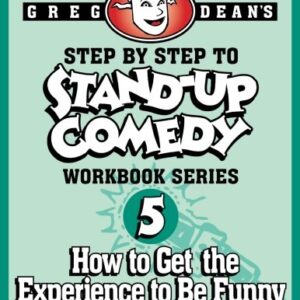Description
YouTube Description...
About the Author
Judy Carter is an author, speaking/comedy coach, and speaker. Her message of using comedy techniques to decrease cubicle stress makes Carter an in-demand speaker for Fortune 500 companies where her keynotes entertain and inspire. Judy’s been featured on more than 100 TV shows, nominated for Atlantic City’s Entertainer of the Year, and has been featured in The Wall Street Journal and The New York Times and on The Oprah Winfrey Show and CNN. When she’s not speaking, snowboarding, or scuba diving, Judy coaches people how to improve their presentational skills by finding their authentic message and making it funny. Her private clients include TV stars, pro wrestlers, celebs, and even a United States senator.
Excerpt. © Reprinted by permission. All rights reserved.
What Makes People Laugh?
Words with ‘K’ in it are funny. ‘Cupcake’ is funny … ‘Tomato’ is not funny. ‘Cleveland’ is funny. ‘Maryland’ is not funny …
—Neil Simon, The Sunshine Boys
What is funny?
I’m constantly amazed at what people think is funny and not funny. Some people will laugh at a guy slipping on a banana peel. Some people will only laugh at Hitler slipping on a banana peel. So, what is funny? If someone laughs, that’s funny.
An audience will laugh at anything, everything, and nothing at all. Trying to figure out an audience is like trying to figure out what to cook your family for dinner. No matter what you make, someone will hate it.
I’ve seen so many comics come offstage after a killer set depressed because all they saw was the one guy in the third row who didn’t laugh at the fourth joke. All the laughter in the room was drowned out by one man’s silence. And it doesn’t matter that this guy wasn’t in the mood to laugh because he just lost his entire family in a fire and stopped in for a drink before killing himself. We still blame ourselves for not pleasing everyone, every time.
Believe in Yourself
Manager Buddy Morra, who discovered David Letterman and also handles Robin Williams and Billy Crystal, among others, says that: “you shouldn’t give an audience what they want. Give them what you want. Most comics will go down to the audience level to make it work, when in fact what you should be doing is bringing the audience to your level.”
The first time Morra saw David Letterman, he instantly knew that David would go on to doing his own show, because he had his own identity. Morra feels that’s what sets apart comics who are special from those who just try to please. You’ve got to believe in yourself.
It’s hard to swallow the idea that you can’t make everyone love you. This one’s worth repeating: You can’t and won’t be able to make everyone love you. You must go onstage with a passionate desire and the intent to communicate your thoughts and feelings, not just to make people laugh.
Five Big Secrets to Making People Laugh
Secret #1: Don’t Tell Jokes
People confuse stand-up with telling jokes. When I go to a party and tell people that I am a stand-up, they inevitably say, “Really … tell me a joke.” When I tell them that I don’t know any jokes, they don’t get it. “But you’re a stand-up comic, right?” Now when I go to parties I tell people that I’m a Kelly Girl.
Joke-telling is the old Catskill school of comedy.
“Two Jews walked into a bar …”
The new school of comedy is personal comedy. Your act is about you: your gut issues, your body, your marriage, your divorce, your drug habit …
Try to find the jokes in Sam Kinison’s act. There aren’t any.
“If you ever think about getting married, sir, just remember this face—ahhhhhhh!”
Sam goes nose to nose with the customer and screams.
Kinison’s humor comes from having an extreme attitude about women, Vietnam, and starving kids. His consistent, angry attitude is the driving force of his success.
My students who pick topics that are truthful and even painful for them are much more successful than those who pick topics they think are jokey or weird. As a matter of fact, the more candid the material, the better it is. People love to laugh at another person’s heartache. I’m not sure why. Maybe because they’re so happy that it’s not happening to them.
Paula Poundstone, the Sylvia Plath of comedy, does a chunk of her fumbled suicide attempt.
“I tried using carbon monoxide, but my building has a big underground parking garage so it was taking a really long time. I had to bring along a stack of books and some snacks. People would go by and tap at the window and say, “How’s that suicide coming?’ And I’d say, ‘Pretty good, thank you, I felt drowsy earlier today.’”
Garry Shandling’s grief over his rejections by women have made him a comedy millionaire.
“I broke up with my girlfriend. She moved in with another guy, and I draw the line at that.”
One of the main misconceptions about being funny is that you have to be a real together “up” kind of person. Not true. It is far more interesting to watch someone struggling with his or her problems than some spiritual, flawless know-it-all. Have you noticed that there are not too many monks who are stand-up comics? Remember … the more miserable your life, the better your act. The trick is to be willing to expose yourself as much as you can without getting arrested.
Secret #2: Don’t Tell Stories
Funny stories usually don’t work. The most common mistake my students make when starting out with ideas for their act is telling stories about something “funny” that “really” happened to them:
“No, no, listen … this is really true.”
Stories might be true, but they are rarely funny and inevitably end with
“Well … I guess you had to be there.”
Another reason stories don’t work is because nightclub audiences most often are drunk and have short attention spans. Any piece that goes longer than five lines without a punch is going to be in trouble.
Bob Fisher, owner of L.A.’s Ice House and booker of seven comedy clubs, will not book storytellers who go three to five minutes without a punchline. “I look for the setup/punch kind of comic as opposed to a storyteller, because I need a comic who will give the audience a certain number of laughs per minute.”
Stories also don’t work because they are frequently told in the past tense:
“So there I was in a department store. And this lady walked up to me and asked me if I worked there. So I told her ‘Yes,’ and ‘All the televisions are free today.’”
Here is the same material delivered by comic Bob Dubac, in present tense, not in story form:
“To have some grins and loosen up, I recommend going to a department store and pretending you’re an employee. When someone comes up and asks you, ‘Do you work here?’ tell them ‘yes’ and that all the televisions are free today. Sit back and watch the fun.”
Keep away from telling stories. What’s funny is simply the way you look at even the most mundane events, such as Larry Miller’s observations about phone cords:
“How does that phone cord always get so tangled? How? All I ever do is pick it up, talk, and hang it up. I don’t pick it up, do a cartwheel and then a somersault, and then hang it up.”
Secret #3: Don’t Try to Be Funny
“You don’t have to act like an asshole to get laughs.
—Anonymous”
If I told you right now “Be funny,” what would you do? A lot of people might start making stupid faces, jump up and down, and do something that would get them committed to a mental hospital.
Being funny has nothing to do with acting weird or outrageous. The weirder you are, the less people will understand you, and no one laughs when confused. As eccentric as comics like Howie Mandel and Sam Kinison are, they make enormous efforts to communicate their ideas clearly. Acting stupid might be funny if you’re performing for five-year-olds, but kindergarten gigs don’t come along too often and the pay is lousy.
Novice comics tend to “try to be funny.” Go to an amateur night and watch comics. A guy comes onstage pretending to be cool. He does his first line and no one laughs. So he tries harder to be funny. He’s talking louder, he’s waving his hands around, he’s become a desperate man. Suddenly you feel that if you don’t laugh, this guy will go home and kill himself and it will be your fault. It’s no surprise that from this point on nothing he does is funny. The harder he tries to be funny the more you pray, “Please God, make him stop!”
If you go onstage desperately wanting a guffaw, a chortle, or a tee hee, you’re liable not to get it. Nothing turns people off more than when they think someone wants something from them. Whether it’s love or laughs, it needs to be given freely. Just as people who are the most desperate for love end up living alone in Winnebagos, comics who are the most desperate for laughs end up keeping their day jobs.
Secret #4: Be Serious
Comedy is a serious business.
The perfect act is funny to the audience and serious to you. Imagine you are a paid whore … a comedy prostitute. In other words, the only one who’s got to like it is the one paying. If it’s funny for you and not for the customers, then you didn’t do your job.
A comic who has made a dedicated commitment to his or her act can make an audience laugh just on the strength of confidence alone. It doesn’t really matter what’s being talked about. Whether discussing the pope or polyps, or even the pope’s polyps, it is the commitment of the comic to his or her material that carries the act. The commitment to communicate, to get ideas across, will provide all the fuel you need. The desire to communicate is the only sane reason to ever get on any stage—ever.
Why? If you don’t believe in what you’re talking about, neither will the audience. The topic you pick doesn’t have to be serious, but your attitude about it does. Whether talking about love or lint, talk to your audience as if your words are going to change their lives. Don Rickles cracks up an audience just by talking intensely in gibberish. It is his ultra-serious attitude about nonsense that makes the audience laugh.
Comic Steven Wright has taken seriousness to new dimensions with his just-out-of-the-grave, deadpan delivery:
“I’m living on a one-way, dead-end street. I don’t know how I got there.”
Secret #5: Relax
Remember … it’s stand-up comedy you’re doing, not brain surgery. Relax and have fun.
The way to make people laugh is to:
Relax and be yourself
Find importance in your material
Have fun
If you really understand these principles, you are ready to begin.
All the world loves a clown and whether you want to clown around at parties or make a living as a standup comic, comedian Judy Carter can show you how to “do” comedy.







![LOOKS THAT KILL [Official Trailer] (2020 Comedy Movie) Looks That Kill Trailer](https://comedytrailers.com/wp-content/uploads/2020/07/v9lf-3pxisamaxresdefault-100x70.jpg)
![Zombie for Sale [Official Trailer] (2020 Movie) Zombie for Sale Trailer](https://comedytrailers.com/wp-content/uploads/2020/07/z4bnxab-0nmmaxresdefault-100x70.jpg)
